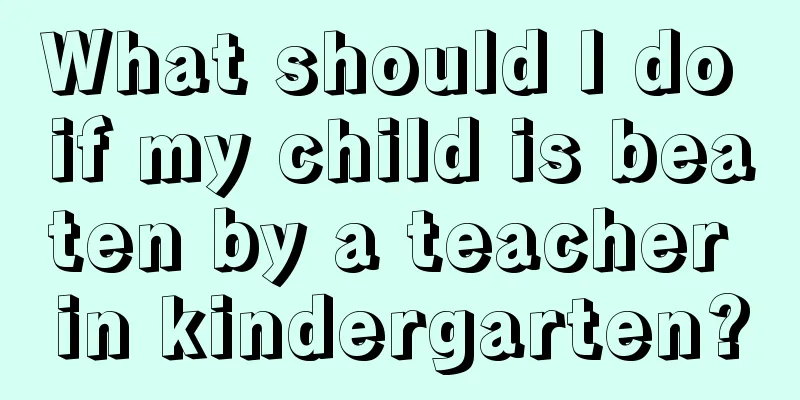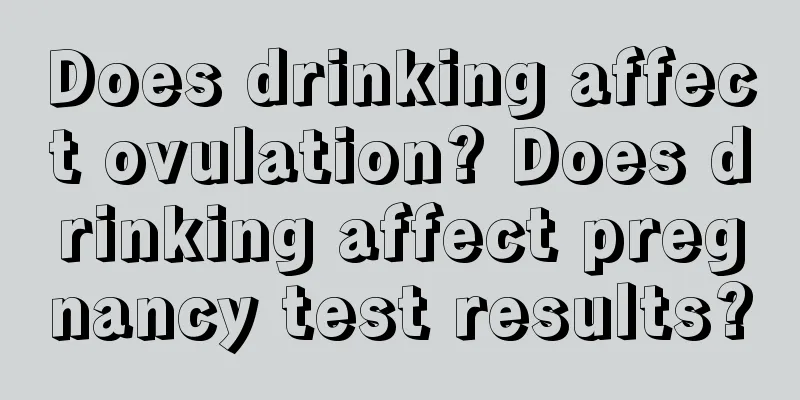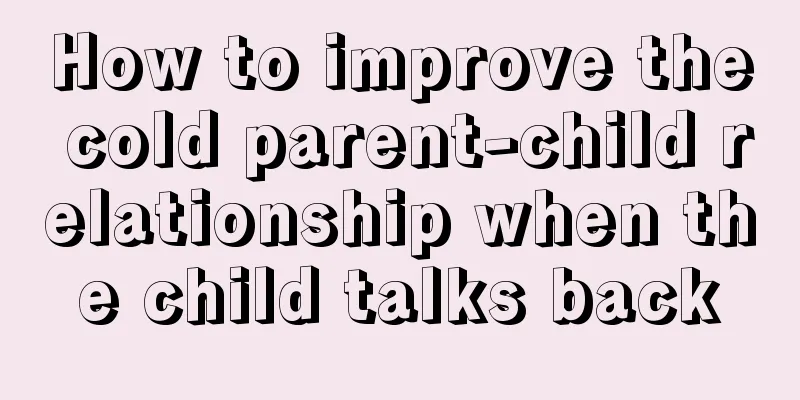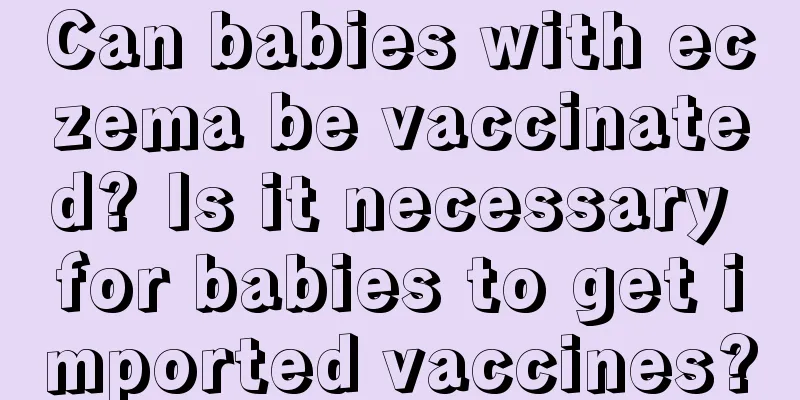How to judge whether a child has food poisoning? What are the sequelae of food poisoning?
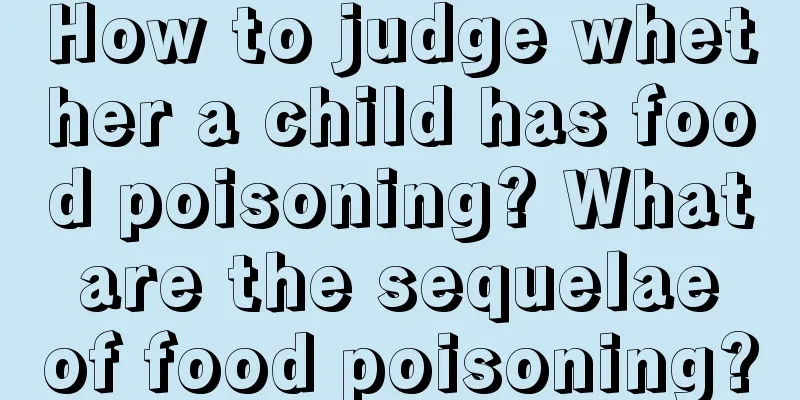
|
If a baby eats something unclean, it may lead to food poisoning. The baby's gastrointestinal function is very fragile. Once food poisoning occurs, parents should take measures immediately. So, how to judge whether the baby has food poisoning? How to tell if your child has food poisoningGenerally, food poisoning will cause varying degrees of abdominal distension, abdominal pain, diarrhea, vomiting and other abdominal discomfort. Abdominal discomfort is accompanied by nausea, followed by nausea and vomiting. Babies with severe vomiting and diarrhea may also suffer from dehydration, acidosis, and even shock and coma. 1. The incubation period is short and the onset is rapid. Many people may become ill at the same time within a short period of time. 2. The patients have all eaten the same food recently, and the incidence is limited to people who have eaten the poisonous food. 3. When you stop eating the food, the illness will stop immediately. What are the sequelae of food poisoning?1 Bacterial infection If you are poisoned by eating food that has serious bacterial infection, the biggest sequelae is that the patient's stomach and intestines will be in a state of bacterial infection for a long time, and symptoms such as long-term abdominal distension and diarrhea will appear. If these bacteria are not eradicated in time, the patient may even develop gastric ulcers or digestive tract ulcers. Therefore, after the food poisoning has improved, a detailed physical examination is also essential. 2. Endocrine disorders. Children’s central nervous system will be damaged after food poisoning, especially after eating some poisonous mushrooms. This damage to the nervous and central systems is irreversible. Therefore, even if the patient does not become unconscious or vomit, the patient’s damaged nervous system cannot be restored. Therefore, for a period of time, the patient may experience symptoms of facial nerve disorders or endocrine disorders. 3. Kidney damage: After a child suffers from food poisoning, it will also cause certain damage to other systems of the body, such as the urinary system and kidneys, because the kidneys metabolize these toxins. If there are too many toxins, it is very likely that there will be certain residues in the kidneys, which will also cause damage to the kidneys. What to do if your child has food poisoning1. Keep suspicious food No matter what kind of food your child has eaten before, once you find that your child has food poisoning, parents should try to keep the suspicious food that caused the poisoning. During the medical examination, it can help the doctor to make a clearer analysis, so that better symptomatic treatment can be given. 2. Induce vomiting in time After food poisoning caused by accidental ingestion, it is necessary to use urging methods to deal with it in time. Generally, food will not be digested quickly after entering the stomach and intestines. Parents can use chopsticks to press the child's tongue to stimulate vomiting, which can expel the residual food in the stomach and intestines and reduce the body's absorption of poisons. 3. Correct catharsis Some people may not experience discomfort symptoms in a short period of time after food poisoning. If the food is eaten more than two hours or even longer, vomiting cannot be used for treatment. Catharsis is needed in time to reduce the intestinal absorption of poisons through excretion. 4. Seek medical treatment For mild food poisoning, vomiting or laxatives can be used to treat it. However, in the case of more serious food poisoning, medical treatment is required in time, usually gastric lavage or enema and other methods are needed to quickly clear the toxins in the stomach and intestines. What medicine should children take for food poisoning and vomiting?Children with food poisoning can be treated with vitamin B tablets, Simo decoction, oral rehydration, Mami Love and other medicines. If the child's food poisoning is bacterial food poisoning, antibiotics can be taken for treatment. For example, cefixime, amoxicillin and other drugs can be taken for treatment. If the child's food poisoning symptoms are more serious, going to the hospital for infusion treatment can achieve good results. |
<<: How to choose a nickname for a newborn? What are the techniques for choosing a name?
>>: How to guide your baby to read picture books?
Recommend
Is it necessary to sweat during the full moon? Can sweating during the full moon cure postpartum diseases?
Sweating during the full moon is a good way to ma...
If the first child was delivered by caesarean section, will the second child be born early? The impact of the first caesarean section on the second child
In the past, natural births were more common, but...
Are breast milk storage bags healthy and safe? What are the precautions for milk storage bags?
Breast milk storage bag is a new product for mate...
Is the second caesarean section still done on the original incision? Is the second caesarean section more painful than the first?
With the opening of the second-child policy, more...
How to solve lactose intolerance in newborns?
After many newborns are born, the mother's fi...
How long is the shelf life of Unicharm wet wipes? How to check the shelf life of Unicharm wet wipes?
The shelf life of baby products is one of the mos...
How should I take care of myself when the due date is approaching? What are the key points of diet during the confinement period?
When the due date is getting closer, pregnant wom...
Does baby drooling mean spleen and stomach deficiency? When does baby drool more?
Babies are prone to drooling during their teethin...
Does the baby need to take medicine after the fever subsides? What should you pay attention to when the baby's fever subsides?
When a baby has a fever, some parents will take t...
Is a spoonful of baby milk powder a flat spoon or a full spoon? How many grams does a spoonful of baby milk powder weigh?
When preparing milk powder for babies, there are ...
Can I drink alcohol while taking Tianxi Pills? Can I drink alcohol while taking Tianxi Pills?
Many women who are preparing for pregnancy must h...
Can I eat fruit during confinement in winter? What kind of fruit is good to eat during confinement in winter?
Everyone knows that it is not suitable to eat raw...
Can pregnant women eat fruit danpi? What are the benefits of eating fruit danpi for pregnant women?
Fruit jelly is a kind of snack with a sweet and s...
What kind of filling material is good for baby shaping pillow? How to clean baby shaping pillow?
Usually most babies like to move when they sleep,...
Do women age faster after giving birth? What should I do if I age faster after giving birth?
After giving birth, women seem to age faster. The...


